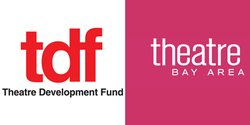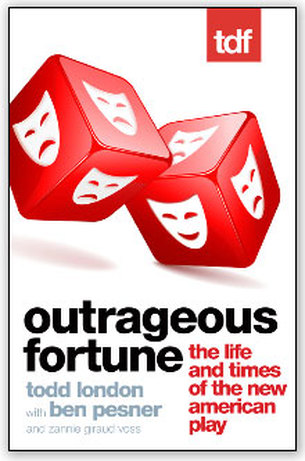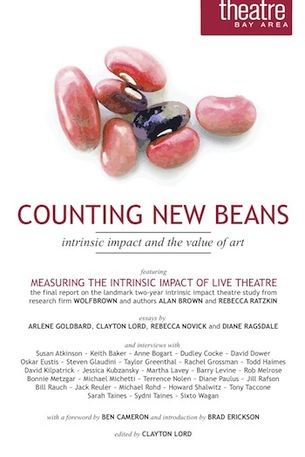|
''It is not enough to demand insight and informative images of reality from the theater. Our theater must stimulate a desire for understanding, a delight in changing reality. ...Theater must teach all the pleasures and joys of discovery, all the feelings of triumph associated with liberation.'' ~~Bertolt Brecht  Yesterday, Theatre Development Fund (TDF) and Theatre Bay Area (TBA) hosted the first for six roundtable discussions intended to uncover the best new thinking and practices around what most effectively links audiences, generative artists and the theatres who produce them. Led by Victoria Bailey (Executive Director, TDF) and Brad Erickson (Executive Director, TBA), the meeting took place at Woolly Mammoth Theatre Company's Rehearsal Hall. Here's information about the project: Theatre makers around the country are experimenting with new ways to connect audiences with generative artists and their work. Through their project, Triple Play—funded by the Doris Duke Charitable Foundation—TDF and TBA are examining all sides of this crucial triangular relationship. They have surveyed playwrights, theatre leaders and audiences and will share their findings at these live and guaranteed lively conversations in each of six cities. They are inviting theatre companies, large and small, artistic and marketing leadership, playwrights, funders and committed audience members to share what's working to excite interest in new work. The project evolved from Outrageous Fortune, The Life and Times of the New American Play, commissioned by TDF, and Counting New Beans, Intrinsic Impact and the Value of Art. As leaders of service organizations committed to building theatre audiences, they believe that conversation between artists, theatre leaders, and audiences about how to approach, market, and advocate for new work is essential to this effort. With that in mind, Triple Play operating in three phases:
Yesterday's conversation happened in two-parts. The morning session was smaller than the afternoon, but both groups had representatives from Baltimore and D.C. area large, mid-sized, and small theatres, with different specialties (i.e., generative, theatre for young people, culturally specific) as well as playwrights of varying career stages and various theatre administrators. While the morning session was off the record, four audience members reported out our discussion for the afternoon session, which HowlRound live streamed. You can watch and listen here: Watch live streaming video from newplay at livestream.com I had the extraordinary privilege and responsibility of being in the room for both meetings. While honoring the closed door nature of our conversation, here are the questions, comments, and observations that stood out to me:
At one point, the playwrights were asked to share their thoughts on our relationship with audiences and arts leaders, and also why we wrote plays. In an attempt to respond to all that had been shared, here's what I said: "I attend theatre out of a deep curiosity to learn more about the world around me. With enough time, money, and the ability to get to the theatre, I'd see just about anything. When friends, colleagues, and students ask for play recommendations, I give them based on how well and how often a theatre presents a diverse range of artists and plays. As a playwright, I write out of a sense of urgency to give voice to members in our community whose stories have not been told. Of course, when a diversity of voices do not appear on our stages, is it any wonder that our audiences aren't growing?" For my part, I'd like to shift the language being used here and many others agreed. The context of the conversation was set around fear:
I don't want to talk about theatre in terms of risks just as I don't want to talk about diversity in terms of a challenge. I'd like us to speak in language of curiosity, discovery, and social change. Interestingly, during part of the afternoon conversation, I also participated in HowlRound's conversation around Race and Representation. The fact that these conversations were happening at the same time, but exclusive of one another resonated with me. As racial demographics continue to shift and knowing that minorities will be the majority in America by 2050, our theatre programming must shift to reflect these audiences. How to address diversity needs to be an intrinsic part of the conversation. There were several attempts to bring this into the conversation ... but it didn't quite seem to stick. When I left the meeting, I thought about Bertolt Brecht. Of course, I was en route to attend opening night of MOTHER COURAGE AND HER CHILDREN at Arena Stage, but also because Brecht understood the power and impact that theatre could have on a community. I think that if theatre artists want to remain relevant to audience, we need to start thinking about how our work if essential to survival and freedom. About Theatre Development Fund Theatre Development Fund, a not-for-profit organization, was created with the conviction that the live theatrical arts afford a unique expression of the human condition that must be sustained and nurtured. TDF’s twofold mission is to identify and provide support, including financial assistance, to theatrical works of artistic merit and to encourage and enable diverse audiences to attend live theatre and dance in all their venues. About Theatre Bay Area Theatre Bay Area’s mission is to unite, strengthen, promote and advance the theatre community in the San Francisco Bay Area, working on behalf of our conviction that the performing arts are an essential public good, critical to a healthy and truly democratic society, and invaluable as a source of personal enrichment and growth.  Each conversation will livestream on the global, commons-based, peer produced HowlRound TV network at howlround.tv. To participate in the online discussion use #trplplay @theatrebayarea and the local theatre’s handle. Click here to learn more.
0 Comments
Your comment will be posted after it is approved.
Leave a Reply. |
My BlogI'm a playwright, dramaturg, and teaching artist. It is here where you'll find my queries and musings on life, theater and the world. My posts advocate for diversity, inclusion, and equity in the American Theatre and updates on my own work. Please enjoy!
Categories
All
Archives
June 2020
Reading List
|


